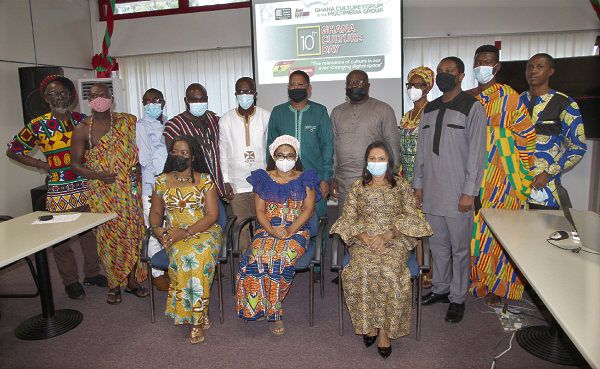
Digital space can deliver big wealth - Speakers tell creative industry
Speakers at a culture symposium in Accra have urged stakeholders in the creative industry to join forces to harness the digital space to preserve the Ghanaian heritage and enhance their businesses.
They observed that the multibillion-cedi industry was fraught with challenges, and expressed the fear that it was on the verge of extinction despite the fact that the industry, in the recent past, had flourished at blazing speed.
Describing the digital space as potent and efficacious, they averred that the deteriorating condition of the sector could be reversed and revamped, especially with the involvement of government agencies operating within the ecosystem, given the platform at the disposal of the industry.
The speakers were the Chief Executive Officer (CEO) of the Ghana Export Promotion Authority (GEPA), Dr Afua Asabea Asare, who chaired the meeting; Professor of African and Gender Studies at the Institute of African Studies, University of Ghana, Prof. Akosua Adomako Ampofo; the Head of Office and Representative of the United Nations Educational, Scientific and Cultural Organisation (UNESCO) to Ghana, Mr Abdourahamane Diallo and the Chairperson of the Ghana Culture Forum (GCF), Mr Asare Konadu Yamoah.
Symposium
The symposium formed part of activities preceding the 10th edition of the GCF’s Ghana Culture Day slated for tomorrow.
The annual event — which is organised in partnership with the Ministry of Tourism Arts and Culture, Ghana Tourism Authority, UNESCO and a number of partners — seeks to promote the cultural and creative economy and to project the Ghanaian identity.
Also present to support yesterday’s programme were officials from the Ministries of Communications, Chieftaincy and Religious Affairs, the National Commission on Culture among others.
The symposium was dubbed: "The relevance of culture in our ever-changing digital space".
In keeping with the COVID-19 restrictions, the event was carried live via Zoom and Facebook for a majority of the participants, with a few people joining the programme physically at the Ghana-India Kofi Annan Centre of Excellence in ICT.
Possibilities
Prof. Ampofo observed that in spite of the “noise and sometimes toxic” debate on social media in the digital space, there were also realities and several possibilities in that digital world.
“Irrespective of our social, economic or cultural background, our religions, our ethnicity, our gender or our age, we connect and share ideas, know-how and experience through the internet and in real time. These exchanges are critical for the evolution and survival of our cultures,” she said.
Government’s role
Prof. Ampofo said for the creative industry to be able to harness the potential of the digital space, the government had to play a critical role by making the relevant technological devices such as laptops, tablets and smartphones accessible and affordable.
“We need reliable community broadband access and reduced cost of provider services, and it is only the state that can make this work,” she said.
She added that the government needed to work towards the alignment of all the laws regarding the cultural sector to make them compatible with one another and to expand the rights of culture-based organisations.
Working in silos
For her part, Dr Asabea Asare advised industry players against working in silos, and stressed that “it requires the collective effort of all of us, including and especially government agencies operating in this ecosystem”.
She also urged players in the creative industry to take advantage of the various online platforms to promote their goods and services.
Dr Asabea said the players ought to put themselves in readiness because “whether we like it or not, we are in the digital world. We don’t even know where we are going every day; it’s galloping, so you better be part of it, and get used to it and learn to deal with it or be left behind”.
She further implored banks to formulate affordable products for the creative arts industry just as they had done for other sectors of the economy.
“So we are just pleading with them to start thinking about the creative industry when they are formulating their products so that they can create specific products to help to do interventions in this sector to help the industry grow,” she added.
Deficiencies
Mr Yamoah expressed the hope that the industry would overtake many sectors in the country if the government addressed their deficiencies.
Mr Diallo encouraged the government and the culture fraternity to carefully consider and also mark the different international culture days to create awareness of culture and development.
